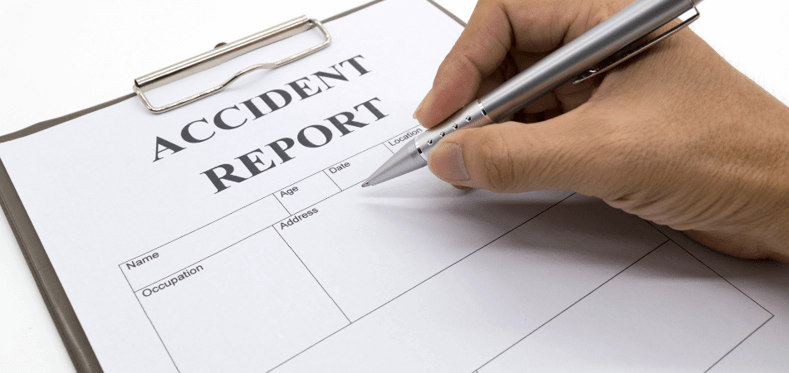Table of Content
- Understanding UAE Car Accident History
- Methods to Check UAE Car Accident History
- Documents Required
- Factors to Consider
- Tips for Interpreting Accident History Reports
- FAQ's
- Conclusion
Understanding the history and current state of road accidents in the United Arab Emirates (UAE) is crucial for promoting road safety and making informed decisions, especially when purchasing used vehicles.
In the UAE, it's important to know if a car has been in an accident before buying or selling it. Our guide explains why checking a car's accident history matters and gives a quick summary of how to do it.
Recent Trends in UAE Road Accidents:
-
Increase in Accidents and Injuries: In 2023, the UAE experienced a rise in road accidents and related injuries. Despite this increase, road fatalities remained near historical lows, indicating ongoing improvements in road safety measures.
-
Leading Causes of Accidents: The primary contributors to road accidents include distracted driving, sudden swerving, tailgating, negligence, and lack of lane discipline. These factors accounted for 71% of fatalities and 61% of injuries in 2023.
-
Demographics of Offenders: Drivers aged 18 to 36 were predominantly involved in sudden swerving incidents, a major cause of serious traffic accidents
By examining accident records through official channels, individuals can access vital information regarding past incidents, facilitating informed choices and promoting road safety.
This guide outlines the steps to efficiently navigate through the process, ensuring peace of mind for all involved parties.
Checking a Vehicle's Accident History in the UAE:

Before purchasing a used car, it's essential to verify its accident history to ensure safety and value. Several official platforms provide this information:
Ministry of Interior (MOI):
- Visit the MOI website.
- Navigate to 'Accidents Inquiry' under public services.
- Enter the vehicle's chassis number (VIN) to access its accident history.
Abu Dhabi Police:
- Access the Abu Dhabi Police e-services portal.
- Select 'Vehicle Accidents Inquiry' and input the chassis number.
Emirates Vehicle Gate (EVG):
- Register or log in to the EVG portal.
- Use the 'Accident Inquiry' service by entering the vehicle's chassis number.
Dubai Roads and Transport Authority (RTA):
- Visit the RTA website.
- Navigate to 'Driver and Vehicle Owner Services' and select 'Vehicle Accident Enquiry.'
- Enter the chassis number to view the accident history.
To figure out why car accidents happen in the United Arab Emirates (UAE), let's check out some numbers and see how they impact society. With lots of people and many roads in the UAE, it's not unexpected that there are more car accidents.
The UAE is among the countries with the highest number of accidents globally. Speeding, reckless driving, and poor road conditions contribute to this problem.
Car accidents in the UAE create significant problems. They injure people, harm property, and impact finances. When accidents occur frequently, insurance companies raise their rates.
This means individuals have to spend more on insurance for their cars, particularly if they've been in accidents previously or reside in areas with high accident rates.
Moreover, when cars are involved in accidents, their value decreases. People are hesitant to purchase cars with accident histories due to concerns about hidden damage and future reliability.
Consequently, cars that have been in accidents are sold for lower prices, which poses challenges for individuals attempting to sell their vehicles.
To improve the situation, the UAE is implementing various measures.
They're making stricter rules about driving, having more police to enforce those rules, and telling people how to drive safely. But making a real change needs everyone's help. The government and people need to work together to make the roads safer for everyone in the UAE.
Methods to Check UAE Car Accident History
Online Platforms
Explanation of online databases available for checking car accident history:
-
In the UAE, there are several online platforms where you can check your car accident history. These platforms typically provide access to databases that store information about reported accidents involving vehicles.
-
They offer a convenient way for individuals to verify the accident history of a specific vehicle before making a purchase or for general information purposes.
Step-by-step guide on accessing and utilizing these platforms
-
Visit the official website of the UAE Ministry of Interior or Dubai Police.
-
Look for the section related to traffic services or vehicle-related services.
-
Find the option for checking car accident history or traffic violations.
-
Enter the required details, such as the vehicle's registration number or chassis number.
-
Follow the prompts to complete the verification process.
-
Once completed, the system should provide you with the accident history report for the specified vehicle.
Police Stations
Getting in touch with local police stations in the UAE is crucial for getting official accident reports. These reports have detailed info about accidents, like who was involved, what happened, and any legal actions or fines.
Getting this info straight from the police makes sure it's accurate and trustworthy, which is important, especially for insurance claims or legal stuff related to the accident.
Procedures for obtaining accident history from police stations
-
Identify the relevant police station based on the location where the accident occurred or where the vehicle is registered. Visit the police station in person or contact them via phone or email.
-
Request access to the accident reports for the specific vehicle or incident in question.
-
Provide any necessary details or documentation requested by the police, such as the vehicle registration number, your identification, and the date of the accident.
-
Pay any applicable fees for obtaining the accident report, if required.
-
Once processed, the police station will provide you with the accident history report, which may include details such as the date, time, location, and circumstances of the accident, as well as information about the parties involved and any legal actions taken.
Documents Required
Want to find out about a car's accident history in the UAE? Here's what you'll usually need:
- Emirates ID: This is like your main ID card in the UAE. It proves who you are and helps you access government services. You need it to check a car's accident history.
- Vehicle Registration Card (Mulkiya): This card has all the details about the car, like its registration number, chassis number, and more. It's important to show you own the car and to check its accident history.
- Authorization Letter (if needed): If you're not the car's owner, you might need a letter from them saying you can check its accident history. This letter shows you have permission to ask about the car.
- Insurance Documents: These aren't always necessary, but they can be useful. They might have info about past accidents and insurance claims for the car.
- Power of Attorney (if needed): If you're checking on behalf of someone else, like a company, you might need a document saying you can do that. It gives you the legal power to ask about the car.
- Application Form: Depending on how you're checking, you might have to fill out a form. This form asks for info about the car and you.
Having all these documents makes checking a car's accident history easier. It also makes sure you're following the rules.
Factors to Consider
Checking how accurate accident history reports are involves considering a few things:
- Where the Information Comes From: The trustworthiness of accident reports depends on where the data comes from. This could be police reports, insurance claims, people who saw the accident, or government agencies that handle traffic safety. But each of these sources might have its own mistakes, limits, or problems.
- How the Data is Collected: The way people gather accident data affects how reliable it is. For example, police reports might not all say the same things because of things like how well the officer was trained, how bad the accident was, or if there were any witnesses. Insurance claims might not be totally honest because the people involved might not want to tell the truth.
- Rules and Ways of Reporting: Different places or groups might have different rules or ways of writing down accidents. If they don’t all use the same rules or words, the data might not match up.
- Chance of Mistakes or Problems: Even though people try hard to make sure the reports are right, they can still make mistakes or be wrong. This could happen because not all the information is there, someone read it wrong, wrote it wrong, or lied on purpose.
- Checking and Making Sure the Data is Right: It’s really important to check and make sure the accident data is right. This might mean looking at more than one place, doing checks or reviews of what’s been reported, and doing things to make sure mistakes get fixed.
- Time Matters Too: The accuracy of accident reports might change over time. Things like how people write them down, new technology (like cameras in cars or reporting on computers), and changes in society can all make the data more or less accurate.
- Being Honest and Responsible: People need to be honest about how they report accidents. They should say if there might be mistakes or things they’re not sure about. And there should be ways for people to ask questions or say if they think something’s wrong with a report.
In the end, even though accident reports help us understand what’s happening with road safety, we have to be careful. We need to think about everything that could make the reports wrong.
By knowing what might go wrong and trying to fix it, we can make sure the accident data is good for making decisions and rules.
Tips for Interpreting Accident History Reports

Understanding accident history reports is super important. They help us know what happened before and spot any repeating things. Here are some tips to help you figure them out:
Let's Understand: Start by learning the specific words in accident reports. For example, "at-fault" tells us who caused the accident, "collision type" explains how it happened (such as rear-end or side-swipe), and "severity codes" indicate how bad it was.
Know the Codes: Accident reports use codes or symbols for different things. Look them up in guides or glossaries to understand them better.
Look Closely: When reading accident reports, pay attention to details like when and where it happened, the weather, and what the road was like. These things give important clues about what went down.
Find the Reasons: Check for things that might have caused the accident, like speeding, distractions, or bad roads. Figuring this out helps make things safer.
Spot the Patterns: Read lots of accident reports to see if any common things are happening.
If the same spot keeps showing up, maybe changes are needed there.
See How Bad: Notice how bad each accident was, like how much damage there was or if someone got hurt. This helps decide where to focus on fixing things.
Get the Whole Story: Remember, there's more to accidents than just the report. Think about things like how traffic flows in the area, road design, and if rules are being followed.
Ask for Help: If some things in the report confuse you, ask experts like traffic engineers or police. They know a lot and can help make sense of it.
With these tips, you'll get better at understanding accident reports and making the roads safer for everyone.
FAQ's
Q1: Why is it important to check UAE car accident history?
A. Checking UAE car accident history ensures transparency and safety when buying or selling a vehicle. It helps buyers assess the vehicle's condition and potential risks, preventing hidden problems and ensuring fair deals.Q2: How can I access UAE car accident history online?
A. You can access UAE car accident history through official platforms like the Ministry of Interior or Dubai Police websites. Enter the vehicle's registration number or chassis number to retrieve the accident history report.Q3: What documents are required to check UAE car accident history?
A. Required documents include Emirates ID, Vehicle Registration Card (Mulkiya), Authorization Letter (if applicable), Insurance Documents, Power of Attorney (if needed), and an Application Form.Q4: How accurate are UAE car accident history reports?
A. Reports may vary in accuracy, but it's essential to cross-reference data from multiple sources and verify critical details with primary sources. Thorough investigations and fact-checking help ensure reliability.Q5: What are the legal implications of accessing UAE car accident history?
A. Ensure compliance with privacy laws, obtain necessary consent for sensitive information, and be aware of legal liabilities such as defamation or fraud charges. Decisions based on accident history can have significant consequences in insurance claims or legal proceedings.Conclusion
In conclusion, checking UAE car accident history is paramount for informed decision-making and promoting road safety. By utilizing the outlined methods, individuals can access vital information to evaluate the condition and reliability of vehicles. It empowers buyers to make fair transactions while ensuring sellers disclose accurate vehicle histories.
Moreover, thorough checks help mitigate potential risks and legal implications associated with undisclosed accidents. Embracing these practices not only fosters transparency in the automotive market but also contributes to creating safer roads for everyone in the UAE. Take advantage of these resources to make confident and informed choices when dealing with vehicle transactions.







